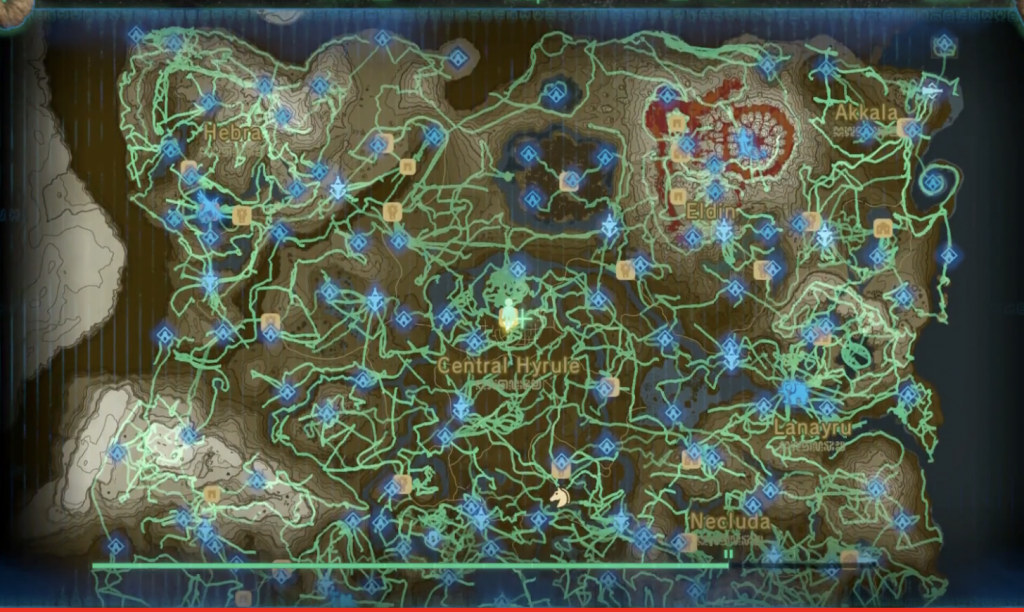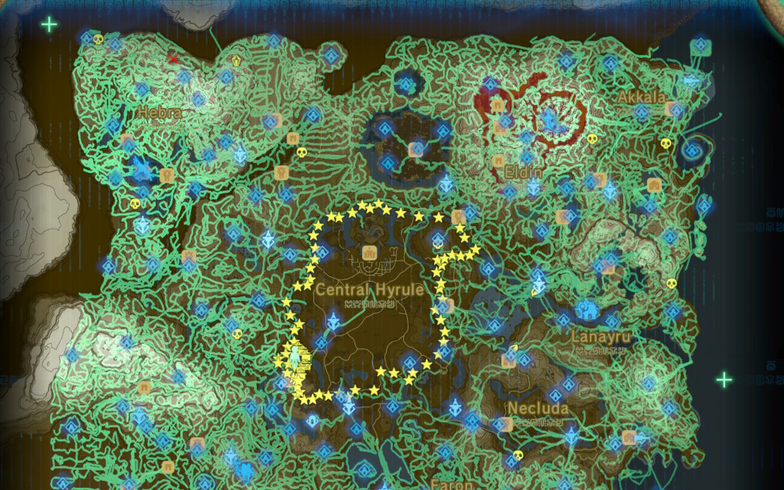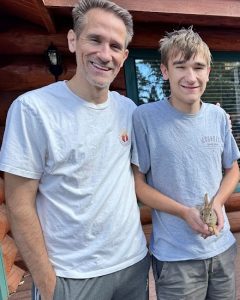Each child is different, so why do we think we’re supposed to show up the same for each one? “Consistency” can be a trap. Discover how to connect with your children in ways that are just as unique they are, and your effectiveness (and influence for good) can truly skyrocket.
Leslie Householder is an award-winning, international best selling author of The Jackrabbit Factor, Portal to Genius, and Hidden Treasures. Having homeschooled her family for nine years, she understands first-hand the challenges and worries parents face in an attempt to bring out the best in children and to prepare them for successful adulthood.
Originally recorded in Mesa, AZ on February 23, 2019
Visuals mentioned on the audio:
Here is a map of the goal-oriented Zelda player’s path, only doing what is minimally necessary to get the tools and skills needed to solve the main puzzle in the center:

Here’s a map of the Zelda player who avoids the final test (center) until they’ve discovered and solved EVERYTHING there is to discover and solve before ending the game:

TRANSCRIPT:
Announcer: Welcome to the Rare Faith Podcast where the solution to every problem is only an idea away and where the same activity with just a little more awareness always yield better results. Award-winning best-selling author Leslie Householder bring some of her best information to this inspiring series of life-changing episodes that you won’t want to miss. Show notes for this episode can be found at ararekindoffaith.com.
Leslie: Alright welcome everyone. This is a nice cozy class which is cool because this means I get to really find out kind of what’s going on with you. If you want to open up a little bit and share. And then I can kind of adjust what I’m saying to, to you. Or I won’t. We’ll see. My name is Leslie Householder. My topic today is on children, meeting them where they’re at. Actually I submitted it as meeting them where they’re at and I think that’s grammatically incorrect but isn’t that also-
Audience member: It’s the sentence in a preposition. No that’s okay.
Leslie: But this is correct? So they, they’ve adjusted that for me. It’s okay, I do have an education, but. So this is my family. This is about four years old. She’s my youngest and she’s now 12 and so we are, we’re entering the new phase of life. She is getting ready to move into some of the teenager stuff soon and we’re excited about that. But the reason I wanted to talk about this subject is because I had a very, I want to say interesting homeschooling journey. But who doesn’t, right? If someone takes that path it’s, it’s a journey for sure. But I’m excited that Christy’s here today because she is part of the reason for that journey. You know that, right? You know that. So I’m gonna back up a little bit just give you some background why I did what I did. And some of the shenanigans and things that went on along the way and those moments of terror where you wonder if you’ve just ruined your family and what is on the other side of that. So I married in 1991 and we started our family pretty quickly. And my first encounter with someone who homeschooled was a friend of mine when we lived in California. She had eight children, three of them were biologically hers, five were adopted from a sister-in-law who needed them to take custody, so very large family. And then they ended up, no let’s see. One, two. Two of their own, five adopted I think, and then two more together with her husband. Anyway it was a mixed family and, and complicated. But they homeschooled. And I really enjoyed watching the way they interacted with each other, the kinds of family trips that they can take together. They were always on the road doing something fun in their big white 15-passenger van. And we were starting to grow a big family at this point. I think I had all but the last two when I first met my friend.
And it got my wheels turning because I could see that how they were living was really attractive to me. They weren’t stressed. I was getting, I was getting really high-strung as soon as the kids start getting into fifth and sixth grade at school, it gets really intense. It gets really intense and I didn’t remember high school being that intense sometimes. It just felt like “Oh my goodness what have we got ourselves into?” And there’s more kids coming up the pike. And so it got my wheels turning a little bit. That was ten years before I actually decided to start doing something on my own. It took me ten years of chewing on the idea to get the courage to pick the one child I knew I couldn’t ruin and have an experiment with her for a year. That was my first experiment and she is the one I experimented with, her name is Kayli. She comes home from a mission for our church on Tuesday. Super excited to see her again. It’s been 18 months. Long months. But when she was in second grade I, I thought “You know what, I want to do this.” And it was the summer before I believe that I was looking for some, some confidence that maybe I can do this. And I was it was being prayerful about it and hoping I could get some kind of input that would help me get over that fear. And about that time I meet Christi. I also met Renae Pelo and I think there were two or three women who were a few years ahead of me in their homeschooling journey and had some fantastic stories about what had happened with their kids by giving them the freedom to learn and follow their own passions. And so it was really fun to hear from, from Christi, get to know her. We went out to lunch and she just gave me her download of what she learned and it gave me some courage. I always have to share the one story about China because it just makes me laugh so hard. I’m gonna try to sum up, okay. So she has one son who enjoyed music. As he got older he ended up going to China to teach English to Chinese children. And they knew at the school that he liked to sing, that he was a good singer. He probably sang with the kids, right?
Christi: I think so. I think he used to in class.
Leslie: Yeah so he would sing with the kids and the principal I guess said “Hey you sing. Would you be interested in representing our school at this talent show?” This community talent show is what he believed it was that he was signing up for. He’s like “Sure.” So he put on his jeans and his BYU sweat shirt, and he shows up with his guitar and he pulls up and he finds that there are people coming to this event in limousines and red carpet business. There was just like big deal stuff. And so he gets up there and he does his thing and long story short he ended up winning what was the Chinese equivalent of American Idol. How these things happen to a person, doors open when you live interesting lives. Stan. Please.
Stan: He hadn’t been there that, he didn’t have the language completely learned by then. He does now. But he had to put the words on his hand for the song. For the song and had to read off of that. He didn’t know enough Chinese. He knew music and he could sing very well obviously. But he had the words on his hand.
Leslie: Isn’t that amazing? So stories like that, that intrigued me and thought “Well I wonder what might happen if I just kind of tune out the world and see what would happen if I were to just kind of unplug and see what each of my children’s paths turn into.” And so that year I told you I took her out when she was in second grade, but I didn’t have the courage to do my own thing. I was a little bit fearful of just kind of winging it even though in my heart I really wanted to because I know my kids better than anyone else, right? We do. And we have intuition for them and stuff. But I was afraid to do my own thing so I thought “Well the safe segue would be to sign up for the school district’s distance learning program where they send you home with their curriculum that they’d be getting at school but you get to do it at home.” I’m like “Cool. That way if I blow it or if it doesn’t work out, she won’t be out of the loop and can reinsert herself without too much trouble.” And so I had also heard from homeschooling families that it doesn’t take as long for a homeschool child to learn something if they’ve got that one-on-one attention, you know? It can go a lot faster. And so I didn’t really crack the books for the first six months I thought “Yay we’re homeschooling! Let’s just live life and take care of the kids and go shopping together and just enjoy one another.” I thought “I’ll open them later.” And we were doing some of the stuff that was obviously fun, you know cuz there were some games and things that they sent us home with too and I do those. But come January I had this thought that “You know what, the standardized test is coming and I’m gonna have her take it. I’m gonna choose into that because I want to know how far off we are.” And I said “So Kayli, we really outta open those books and see what we should be learning.” And she’s like “Okay.” So we opened it up and I looked at their lesson plans and it was literally they expected me to stay with her for six hours a day and it would have taken six hours to do everything they say to do with this one-on-one experience with the child. And I’m like I, I was panicked. I’m like “I’m so far behind. Oh no what are we gonna do?” And I called the district and I said “I think I made a big mistake. I don’t know what I’m doing. We’re so far behind.” And the district distance-learning head said “Oh honey, calm down, calm down, don’t worry. Just start where you are, she’ll get it all again next year.” I thought “You mean I can blow off six months and the public school isn’t even concerned?” That just kind of tweaked me. I’m like “How can I blow off six months and they’re not concerned?” I thought “Well if she’s gonna get all of this again next year…” It just dawned on me that at least in that program at that time and this has been ten years ago fifteen years ago that they, they would introduce subjects one year and then they would repeat it all the next year, and hoping that at some point in those six hundred days or however many days there were that all thirty children will tune in at some point to get it. Right? But it doesn’t take 600 days to learn this material. So that was one of the first things that gave me the courage to say, “Alright you know maybe, maybe I don’t need to be so worried.”
At the end of that year I had her tested having only done a fraction of what even the school said we should be doing and she tested right on par with where she had been every year before. And I’m like “Isn’t that interesting.” They are learning. They’re learning constantly even if it’s not formal. And how many of you recognize that in your own children? They just learn. They learn. So after that I decided to just kind of do it my own way. And each year I’d invite the kids “Do you want to be home with mom this year?” You know cuz bit by bit we’d add another child or whatever. I have this child, never did decide to come home with me. He was in junior high when I switched over. “That’s fine, you know you’re having a good time, you’re doing well.” This one, he’s funny. So he was my oldest. Still is my oldest, and he every year for 6 years I was saying “So do you want to be homeschooled this year?” And he was in junior high when I switched over. Also, he hadn’t been interested. “No mom. No mom. No mom.” And so his senior year in the fall he went to a lecture by a man named Glenn Kimber. How many of you’ve heard Glenn Kimber speak? He went to a lecture by Glenn Kimber that talked about the Founding Fathers, the Constitution, American history, and it was American history from a point of view and in a context that my son Jacob hadn’t heard in school. And something lit up in him and he was fascinated by it. And he came home and he wanted to learn more about it. And he was in math class one day that fall, senior year, and the math teacher said something about one of the Founding Fathers that Jacob knew from this lecture had been a falsehood. And he also knew how it started, who was behind it, why, and all this stuff. He had some history around that particular fact. And so my, my son raised his hand says “Well actually that’s not true because X Y Z.” You know. And the teachers like “Well if you go get your sources I’ll go get my sources and we’ll talk about it.” Because this is all going on in front of the classroom. And so my son comes home and he is up past midnight just devouring anything he could find on it, reading, preparing a paper about it and everything. And he goes back to class and he’s like “Well here’s what I found.” And the teacher, they go through it and the teachers like “Okay I stand corrected.” And my son was just like empowered that you know that he could learn something outside of school that that he could be really excited about.
And so January of his senior year he says “Mom I’m ready to come home.” I’m like “Uh uh uh uh uh. No, no, no, no, no. You got to finish what you started. I’ve been inviting you for six years. You got to finish what you started. This was your choice.” He’s like “But mom, I am too busy studying to get my schoolwork done.” How does he know my button? How does he know my button? Because my goal for my kids was I want them to learn to love learning. Because if they can love learning, then they can figure out anything they need to know, anywhere, at any point in time in their life. And the things that become important for them to learn, they’ll know how to learn it. And so I’m less concerned about what they know as I am about whether or not they enjoy the learning process. And so after he said that I’m like “Well, well, what do I do with this kid?” Said “We need to find out what’s gonna happen with these universities you’re interested in if you drop out right now.” You know? And there were just a few he was interested in and we contacted them and were like “What’s it gonna look like if he doesn’t graduate?” They’re like “Does he have his ACT?” I’m like “Yeah he had that last year.” They’re like “That’s all we need.” I’m like “What’s senior year good for?” “Good question.” So he had his ACT already and it was an interesting day at the school when I took him in and I said “Okay we’re withdrawing my son.” It’s January his senior year and we’re gonna withdraw him.” They’re like “And where is he going to?” Said “Home.” And they’re like “Where?” And they just didn’t get it. And they’re like “But what about what about college?” And I’m like “We’ve already talked to them. He doesn’t need a diploma.” And the guidance counselor didn’t know this. I have a soapbox about that personally that the guidance counselor that’s supposed to help you get into college doesn’t know you don’t need to be graduated. So and it may depend on the school but all the universities that I’ve contacted, not only do they not need a diploma from a high school, but they teach you how to create a home school diploma. They want to know that- they should they can give you a template that says “Here fill this out just so that we know in our language what your kid has done.” So that was really cool.
That was one of my big questions “Well what if I homeschool? How am I going to graduate? How are they going to go to college if they want to go to college? How’s that gonna happen?” Anyway that it’,s it’s great because nowadays the universities are much more flexible about that and not only that but homeschool students are very, very intriguing to them because these kids love to learn and they’re sharp. So I believe that each child comes to us with unique gifts, talents, and challenges. They each have different personalities. So parenting is not a one-size-fits-all activity. Life has a way of teaching us exactly what each child needs if we learn to pay attention to the clues as they are presented. So let me just find out from each of you, first of all raise your hand if you are homeschooling right now. Raise your hand if you’re thinking about it. Or raise your hand if you have in the past. Okay. What are some of the biggest concerns you have as parents when you’re doing this? Like what are, what are the things that worry you about your different children, maybe the different needs that they have. This can be open discussion if somebody wants to share or ask. Yeah.
Audience member: Like I was telling you earlier my two kids are 8 and 10 and even though they were 3rd and 4th grade. I think my ten-year-old should be in higher-level. He was in advanced classes anyways. And my eight-year-old should be I guess a grade below. I’m new, I just started in September and October to home-school him. First my eight-year-old, then my ten. And my concern why I waited and maybe is I’m still a little bit hesitant with my ten-year-old is the fact that like you were talking about, what if I ruin him? And I don’t give him, I don’t keep him going at his full potential like he was doing in school. And so the reason he’s home was because he just want to be home with mom and sister. She’s the one that had the need. Him, not really. So I worry that, what if you know if he eventually- because right now I’m saying “I’m not going home school in high school because that terrifies me.” I may change my mind but right now I just think “Okay I’m gonna send him back to public school for high school.” So I need to make sure that he’s keeping up to par or he needs to be so he’s not behind when he gets there.
Leslie: Yeah okay, okay I love that you said that. Did any of you homeschool for elementary school but intend to or have sent them to a partial high school or anything? Yeah I’ve done that. You did that? And you can tell me if this was something like your experience. But about about four years ago I felt like that it was time to change things up for my 14 year old. My 14-15 year old who I felt like was slowing down in his learning. He didn’t even think he was learning anything the whole time. He’s like “I’m not learning anything” because he’s at home and he was having a little, just- but I could see the growth that I was looking for in him. And I’ll give you some examples in a minute. But when he was 15 I thought “I gotta shake it up. We need to at least get him some experience in a classroom setting where he’s answering to somebody else who is trying to instruct him, because I don’t want college to be the first experience with that.” And so he jumped in at the time and I’m gonna share a letter that he wrote in just a minute. I found a school that, I mean I’ve been looking at first for at least where my youngest boy could just go do band. I just was looking for a band for him to join because he played French horn and, and we just moved and I was looking for someplace that would accommodate that. Most of the schools were not willing to accommodate that unless we took at least four credits and we weren’t ready to do that. And so I finally found a charter school in our area where I sat down with the principal and I said “Here’s what I’m trying to do is there any way you can accommodate that?” And he looks at me and he goes “You know what? I think homeschooling is the best thing for children. I’m just really glad that some parents think we’re a nice second alternative.” I’m like “I found my home!” Because I didn’t get the looking down his nose at me. I’ve been there before you know. And I just felt so respected. And my daughter who I pulled out in second grade, she was with me in this meeting. She would have been a junior at the time. Junior age. And so we were looking at maybe putting some of the other kids in for part time.
And as he’s sitting there talking with my daughter who has only been home with me since second grade and these, this, this system that we were doing. Which a lot of it was a lot like unschooling. I mean it was very it was a very active and involved in everything, but by academic standards it would have looked like unschooling. So I’m sitting there with her and him and he’s talking with her and he says “And by the way, I want you in my AP history class.” And she’s like, she’s never been in a class since 7th, 2nd grade and she’s looking at jumping into AP History. And I’m like “No thank you, I did the AP classes. That’s part of what took me 10 years to unwind from, you know.” I was just so wound so tight coming through the school system, I was good at it but I was, I was a stress bundle by the end. And I didn’t know how to relax and I had learned since that you don’t have to approach life that way. But it was a long learning process for me and I didn’t want to wind her up that way. So I’m like “No, no thank you. We’re not into the stress of that.” And he’s like “Let me explain why I want her in that class.” He said “There is a different level of conversation that goes on there and she would not be happy anywhere else.” Based on his interaction with her he could tell that she had developed to a point where that’s where she would need to be to feel at home. And that was a new thought for me. It was a new thought for her. And as it turned out. I ended up putting each of my kids in that school.
But back to your point, at the time that I moved my kids back into school after a nine-year stint with homeschooling, I had a daughter who was in sixth grade. She was starting sixth grade. She’s the one off to the right. When she was in sixth grade, I put her into the school and she’s a social butterfly, she’s energetic, she’s dramatic, she loves a party, she loves pretty things, and doesn’t love to learn academically as much as some students do. So my goal for her was to see if she could learn to love learning in the school. And so I told her I said “Bethany, this first year back” because the only other schooling she’d had when she went to kindergarten. Which that’s a funny story, I’ll have to tell you about that. Remind me if we have time. I’ll tell you about the police officer, okay? Kindergarten. Yeah. The cops, they were wondering why the cops hadn’t been showing up at my house yet because I kept pulling her out for family vacations. That’s another story. But so I told Bethany, I said “My goal for you this year is just to get adjusted to the way they do things. I don’t care about your grades. I don’t care what your scores are. Just have a good time. See if you can learn something. See if you can enjoy yourself.” She’s like “Okay.” And I sat down with the teacher I says, “I want you to know that I don’t care about her scores and I don’t want you to care about her scores.” and he says “I don’t care about her scores either.” And so we had a connection there. And so because neither of us cared about her scores, she found it within herself to want to do well. Which was really magical because she hadn’t had a lot of formal schooling. Didn’t have an education par to sixth grade with her friends. But by the end of the year she was getting A’s on her work. She’s now in ninth grade and she works really hard and gets A’s on things. But most of all, she is self driven because I haven’t pressured her. I’ve given her the space to develop at her own pace. And it’s funny, she comes home, she tells me “Mom, I told- my friends ask me ‘what would your your mom say if you wanted to drop out?” She’s like “Well she’d let me.” They’re like “What?” Because she asked me, I’ll ask her “Hey Beth you, you want to drop out? You want to be homeschooled again?” She’s having too much fun now with all these friends that she’s happy.
But I have just found that the kids really really come into themselves when they’re not being educated, but they’re given a space to educate themselves. And that, you know the root word for educate is “educo” which is “to come from within”. And so I’m going to get to some of the principles. First of all, every child is unique. Right? This one is the one who at 15 I thought “I’m a little concerned. I need to get him working on his math.” He was the age of a sophomore and he still hadn’t let me require that he finished the fractions and decimals section of elementary school. He just got stuck on fractions and decimals, didn’t want anything to do with it. But he loved computer programming. He loved to be on the computer. And there was one time when he was about 13 that he was upstairs working on a computer program and one of the things he had wanted when he was 10 is like “Mom, I want to learn Python. It’s a computer language.” I’m like “Okay.” You know and I’m doing this homeschool thing where I follow what they want to do. So I’m looking it up and I can’t find anywhere where he can learn Python. The only place that offered it was corporations coming into other corporations to train employees for this like $2,000 training session of organizational whatever’s. And I’m like “He’s ten. How do I get him into that?” You know. And so I ended up finding a professor at a college nearby who was on wyzant which is a tutoring website. We found this professor who’s willing to come to our house once a week and sit down with him and teach him Python.
And so then fast forward, he’s about thirteen and he’s upstairs working on a program and he’s like “Hey mom how do I get this ball to speed up as it gets closer to the hole? What would I do with that?” I’m like “I don’t know, it’s probably some kind of inverse relation. It’s, it would probably be a fraction or something.” And he’s like “Huh.” So he plays with things like “Oh that actually made it slow down. Oh.” And so he flips it around and says “Oh I got it.” I said “JD do you know you just did algebra?” He’s like “What?” I said “Yeah you just did algebra. It’s about finding the unknown variable. You know finding unknown figures.” And he’s like “Really?” I said “Yeah.” He says “Well I think I’ll like algebra.” I said “Yeah so you should probably do your fractions and decimals.” And he’s like “Ugh.” And then he asks me “Mom what’s calculus?” I’m like “Come here.” So we sit down and we look up something on the internet about calculus. It was like a little video clip probably on Khan Academy. And I said “Just watch this and see what, let’s see what you think of it.” And he’s watching it and he’s glued to it and he’s like “Oh, oh.” And he starts going “Ah!!” He was doing that and I’m like “What?” He says, “Do you have any idea how happy, happy this makes me? I’m like “What?” He says, “I finally understand the point of graphs, like the point of a graph.” And he’s like “This makes sense.” because of what he’d been doing in this computer programming. It means calculus was making sense to him. But he hadn’t done his fractions and decimals. And so I thought “Alright, let’s, let’s just skip fractions and decimals.” I figured if he needs them at some point, it’ll matter in that moment and he’ll go grab it and then he’ll get it to move on. But he doesn’t have to sit and focus on fractions and decimals for a unit and drill and stuff like that because there’s no application. So instead I said “Let’s just, let’s just play with some calculus.”
So when I brought him to that school he was 15. The first year he took. And I’ll, I’ll read this to you now. So he is now 19. And what happened was that first year he took three classes just to kind of get his feet wet. I think it was seminary, speech and debate, and one other. He didn’t want anything too intense, you know. But then the next year he’s like “I know I want to be with my friends in their math classes and all I’ve had is pre-algebra.” You know he’d done that at home some. But he thought “I really want to be in calculus by the end of my senior year.” And so the reason I have this in my hand is because two weeks ago, and by the way when the conference coordinators created this and asked what our topics were, that thought came to me. “Children- meeting them where they’re at” which is bad grammar but I called it that anyway. My thought was about JD. I wanted to talk to you about JD and, and what I’ve learned parenting him. Because it’s been a little bit nail-biting over the years to see this brilliant, brilliant young man. I mean he has a, an amazing brain. Amazing brain and me wondering if I am holding him back, if I’m stunting his growth by not feeding him with all the possible classes he could take in and do well at. But instead, letting him be bored. Letting him be bored. I’m going to talk about that principle in a little bit. But deep down I felt like this is what I needed to do is to let him be bored and find out that he is the captain of his soul. He is the one that if he wants to learn something, let him be the one to go be hungry for it. And like I said, nail biting for a while. But I believe that each one of us is born with an innate desire to learn all that we need to learn to accomplish and fulfill our life’s mission. And so if it’s not important to our life’s mission, then we won’t need to learn it. And if it is, then we will have that innate desire to learn it when we need to learn it. And I banked on it. I risked my family’s education on that principle because it felt so true to me.
And so when I gave the conference coordinators this title I was thinking about JD but then my next thought was “What, what do I have to show for it?” What can I show that says JD turned out okay. You know? And I mean he’s a good kid. He’s a good kid. He’s, he’s fun, he’s smart, he’s bright, he did well in school, but most of the time lately he’s been playing video games. And momma bear in me is like “That’s not okay.” Right? I don’t know if you’re familiar with Legend of Zelda. It’s an adventure game where they go and solve puzzles and just explore and it’s problem-solving. And there was one day that he was playing the video game and I’m thinking “He should really be doing something more productive.” And for a while there the family, all of us would kind of get on his case about wasting his time. About escaping. Until something inside told me “Stop it and sit down with him and watch. Watch what he’s doing. Watch what he’s doing.” And so this is a map of The Legend of Zelda game. I don’t really know my way around it but somewhere on here is this main castle where a lot of people play this game by going around, gathering resources and getting to the castle and saving the girl. And that’s the ultimate goal of the game. And once you save the girl, it’s all over. You know, game ends. And you have to gather resources in order to accomplish this and in order to fight the obstacle that are in the way. And so a goal-oriented person which is like me would just see how fast I can get it over with. Right? When he showed me his map, it looked like this. He said “I intentionally avoid that castle because I don’t want it to end and I want to make sure I don’t miss a thing that could be solved on the peripheral. I don’t want to miss a thing. I want to conquer every puzzle that’s on this map before I go solve the main puzzle.” And something just kind of woke me up and said, “You know there are different personalities. Our kids are so different. Some are very goal-oriented, they want to check it off. They want to check it off.” And a lot of times our system and even us as parents reward the child who is goal oriented. And we don’t really acknowledge so much the child who just loves learning and doesn’t want to miss a thing.
And so when I saw this, my first thought was “Oh my goodness JD plays the game the way he lives his life. He’s not in a hurry to do the next thing because he’s still figuring out everything there is to figure out on this level.” And it just changed the way I viewed him. And now the whole family sits and watches and play and we laugh about the things he finds and, and he’s not made wrong anymore for that. And I also realized that he wasn’t escaping, he wasn’t escaping to the game. He was keeping, his brain is so hungry to solve problems. It’s what he does. That he does is to keep his brain sharp while he’s saving money to go to college. He had to come home after the first semester because he ran out of money. And he’s just been saving up and waiting until he could go back again. And so our family life has been a lot more joyful by meeting him where he’s at. That makes sense? Alright. So that was my, I wanted to share that with you. But then I thought “Okay well how do we know he’s going to turn out okay?” Right? A week and a half ago he tosses me his phone and I pick it up and normally it’s a funny joke or something he wants to share with me and I look at it and it’s not a funny joke. It’s a letter from Brigham Young University and it said “Congratulations you’ve just been given full tuition scholarship for the next three semesters.” I’m like “What? Wait what? What’d you do?” He says “I applied for a scholarship.” I says “Well when did you do this?” He says “January.” I said “Well how’d you get it?” He says “I wrote an essay.” Like no big deal, you know. And I said “Well what did you write?” And so he told me and I hadn’t read it until yesterday. I said you need to send that to me because I want to share it with the class. This was his essay that got him a full tuition scholarship to BYU. He says- oh and then I said “JD why do you let us think that you don’t do anything all day?” And he just grinned. He just loves being this mysterious anomaly in the family.
Here’s what he said: ”My name is JD Householder, I’m 19 years old, being born on August 12 1999, and my mom says I’m handsome sometimes. I like to read, hang out with friends, play video games, learn, and generally improve. I was born in California and I moved to Arizona when I was 4 years old. I started my first day of school about three months later and I never felt like I fit in. It always felt like there was something I didn’t understand socially. Sometimes there was a rule I didn’t know about or I didn’t know how to behave around others. It was as if I was put into a sport without knowing the goals or rules and it was very disorienting. I was able to make lots of friends anyway but that feeling of not knowing what I was doing was still there. My years in homeschooling were very unproductive.” Thanks for painting me that way honey. He says “We used a system that relied on self motivation to learn as my mom didn’t want us to be burned out on education. Great in theory but at the time this meant that I didn’t do any learning. I worked on problem solving skills by playing online puzzle video games and since my mom and dad were busy trying to keep our family of seven kids afloat after the, after the recession, we, my older sister and three younger siblings also learned a lot about housekeeping and cooking. I always loved computer games and I decided when I was 8 or so that I wanted to learn to make them. So over the course of my homeschooling I taught myself JavaScript, HTML, CSS, PHP, Python, my sequel, and a little bit of Java. Also I could learn how to make these computer games. I took seminary as a high school freshman, when I was the age of a sophomore I still had essentially a second grade education. And I knew I had to fix that. I started slow taking just three classes: seminary, Latin, and speech and debate. I enjoyed the challenge and I bumped it up to seven classes the next year. I knew I needed to get caught up on math if I wanted a future in computer programming and I started with algebra 2.” He started with algebra 2. I remember the conversation we had the math teacher like where should we put him? And the math teacher for some reasons that I want you in my class. And he was the right personality to help him. He mentored him through that year. He says “It started rough.” Can you imagine? He hadn’t done his fractions and decimals yet. “But by 1/4 into the school year I refused to let a single problem go by without fully understanding it. I passed the class with a hundred percent and leftover extra credit. As a senior I knew I didn’t want to stop at anything below the best, hardest class my school offered which was calculus. I spent eight hours a day through the summer on Khan Academy so that I could skip pre-calculus and go straight to it by the time the year began. I was the only one prepared for the class as the school’s only pre-calc teacher’s abilities were lacking to say the least. I became the math tutor for nearly everyone taking that subject whether in my class or not. The valedictorian, also a BYU student credited me in her speech as the reason she passed the class. I also took my first English class ever that year.” his senior year “and ended up earning the student of the year award for the school, not just for the class. I love learning, I crave the challenge, and I hope I can continue to do so here at BYU.” He’s interesting, right? He’s interesting.
And every one of us I believe has the ability to learn what we’re interested in desiring to learn. And I think if we rely on that principle as we raise our kids and we start looking at who are they, what are their interests? We don’t know why they have those interests, we don’t know why they’re inborn, but as parents we can look for those clues and just see where it leads because it leads to interesting things. Now you might think “Okay well he’s just one child that’s an interesting story.” I can look at each of my kids and see how they all took different paths to get to these places that are so unique and so fulfilling for each of them. I now have 26 year old, a 23 year old, a 21 year old, a 20 year old, and my youngest is 12. And so I’m seeing that they’re all coming out of it with this personal leadership. Personal leadership. So let’s talk about the formula. So here’s a formula that I found seems to work for each child and you might ask yourself, think of the one child you’re most concerned about right now. What do you want your child to be doing but he or she is not doing? For me it was JD not doing fractions and decimals. Or more recently it was JD not working harder to get on with his life. You know? When you can’t see there’s progress going on it’s hard to know if they’re just wasting away. What are they doing now instead? In JD’s case he’s playing that game. What are they good at doing? He was good at the game. Yeah. And so I saw a big gap between what I think he should be doing and this playing the game thing.
But I also recognize that for him sometimes he would avoid being with the family. Like if we were having a family activity, he sees himself as an adult now because he’s now 19. You know. He’s older than 18 so it doesn’t have to be with the family things as much. And I’m like “Well let’s figure this out. Are you a roommate? Because roommates pay rent. Or are you a family member.” You know. And we’re having this discussion and so for him, a step towards being that independent grown human being would be the way he interacts with the family. I’m like “Okay so you are an adult in the family. Alright this is what that’s gonna look like.” I found out that he is really, really, really good at moderating tense conversations. He’s very logical, he doesn’t get emotional, and he says “I learned from watching my older siblings fight with my parents that an argument goes better as long as you don’t escalate your voice higher than the person you’re arguing with. If you can always stay a notch lower than that person, then-” I can’t remember how he put it but it goes better. It diffuses things because instead everybody’s trying to escalate higher than the other person. So he, we recognize he has that skill. And we were having a family council and some of the kids were fighting and I was like “I don’t know. I don’t know what to do with this because you’re right and you’re right and it doesn’t work together.” And I looked at JD like an adult and I said “JD what would you do in this situation?” And he had the answer. He’s like “da-da-da-da-da.” And it was gone. I was like “Oh you’re good at that.” And he said “I don’t mind being the moderator, I just don’t have any authority.” I’m like “Alright family, what do you think. Can we give JD some authority in moderating arguments with the kids?” And everybody was like yes except for Sarah. She wasn’t sure that would be a good idea. But we discovered a talent that he has and we focus on that. We focused on how good he is in his game and because we are now appreciating him for who he is and his skills, everything else is starting to fall into place.
The fact that he would go and get himself a scholarship without me even telling him how to do that, I tried that the year before and hit brick walls. I’m like “You are so talented you could totally get scholarships.” “Yeah I probably should.” And never really followed up on that to the degree that he could. So he did that all in his own. And then the last thing is “Trust in the principles.” So here is the principles. Alright number one “There is genius potential inside of each child. Each child has a unique mission to fulfill. Every child is born with an innate desire to learn everything they will need to know to fulfill their life’s mission. Knowledge is awesome but I believe a love of learning is even better.” “The solution to every problem is only an idea away” and that is a principle I’ve relied on with each of my kids whenever I’m facing a “Oh my goodness I don’t know what to do for this child right now, I’m stumped.” I have to remember that the solution to that is only an idea away and I can tap into those ideas by imagining the outcome that I want. If I see them in my mind’s eye on the screen of my mind as a productive, happy adult raising a family, whatever, I, I see for them and I imagine that. And I imagine it as if it was already happening to put myself in a happy grateful place, then I come back to the problem I say “Well what is the solution to this problem?” And I can see it more clearly. There’s something about seeing it and feeling it that kind of tunes you into a different broadcast of ideas.
The solution to every problem is only an idea away and the idea you need is already in the room like a radio broadcast. It’s just as close as KFM90. Whatever is in the room. Gaining confidence in one skill helps children believe that they can learn other skills and that’s why it’s okay to let them focus on the thing they love. Let them get really good at the thing they love. I heard a young man come back from an experience that he was trying to teach these other kids how to prepare for this difficult experience and he said “You know, what if you want to really be prepared for life or this experience,” He says “Just get really good at whatever it is you love doing. Get really good at that.” And he even said ”If you’re really good at, if you love video games, get really really good at it. It will help prepare for this harder experience. If you love basketball get really good at that. It’ll prepare you because you gain confidence in one area and that spills over.” People approach the next thing like “I can do things. I can do hard things.” And they approach it with more optimism. And this one is huge. I believe that our children’s internal guidance system is alive and well. We need to believe that they are being tutored intuitively and create space for them to be receptive to it. And what do I mean by that? So at a time when I was feeling especially overwhelmed raising my kids and homeschooling them and trying to run a business, all during the recession. It was mayhem. And I remember feeling particularly concerned that I wasn’t sitting down and educating my children directly. And I had this distinct impression not to worry because they were being instructed I believe from God directly. And I can say that I believe that because I remember as a child being the youngest and my family moving us different places around the world and having a lot of alone time. And I just remember the looking back I can recognize times where I was thinking and pondering and wondering and asking questions in my mind about stuff.
And I look back now and I can see that those questions were planted in me because they had something to do with my life’s purpose. I can see it now. I didn’t know that that was happening at the time, but I can see it now and I believe that our children are experiencing that when we give them the space to go inward and think. Give them a space to think. Give them space to think and solve problems and to wonder, ask questions. You know they’re looking at the world around them and trying to make sense out of it. You know they’re doing that. Children do that. And if we fill their day with so much stuff that they don’t have time to think or ponder, they can miss those little clues that guide them to the most fulfilling life that they can achieve. And then again doors open when you’re different. And so I learned with each of my kids that even if they learned something late, they still learned it. Even if they didn’t learn it all, if they need it they know how. And it just made it more peaceful for me to not worry and to just take it a day at a time. Take it a day at a time. Your children are yours for a reason. That relationship that you have with them is as unique as they are and I believe it’s by divine design that you are their parents. And that what they need to learn they’ll come to it. They’ll come to it at the right time. And they also learn how to feel about life by the way we feel about their life. If I’m worried about my child and they see it or they sense it, then they might worry about themselves. And so you can assure them, you can assure them “I’m not worried about your scores” if they’re in a system that provides scores. Scores don’t matter. They don’t matter. It’s just feedback. You know. “I just want you to love what you’re learning. See if you can love learning a piece of this. What’s in here for you to, to discover?”
Do you have any questions about this? We need to wrap up soon but are there any questions? Anybody overwhelmed?
Audience member: I’m just curious, did all your kids at some point go to public school?
Leslie: Yes.
Audience member: And the one that came, or that went into the public school older why did that happen? Like did you decide or did they?
Leslie: I decided. Well it was like, it was all stemming from first my son who wanted to go to band and so I was looking for a school that had band. And when I got there and I found out that they had that they would allow my children to pick classes that interested them. I just saw it as a way of supplementing what I was doing. And this was when the charter school was new enough that they could accommodate that. I know that they can’t do that as well now if somebody shows up, they do require four credits and and all that stuff. But I’ve been happy with the school. And so we just kept them there. But I am the parent that says “You’re burned out? Let’s take a day off.” You know. I don’t hesitate to do that. Some of the other things that have happened since then, so my oldest I told you he quit his senior year. He’s at BYU-Idaho and he ended up getting through school almost entirely on scholarships even though he didn’t graduate from high school. My daughter, the second grader that I pulled out who’s coming home on Tuesday, she’s got this thing where she wants to prove to the world that she can do anything she wants without even a GED. She doesn’t even want the GED. And so far, so good. She’s been able to go to university, she’s gotten a partial scholarship at one, and she’s doing what she loves you know. And so they’re all so different. They’re all so different.
And the Genius Boot Camp right here, what that is, is that’s a three-day workshop where I help parents and we have had youth come before, but it’s mostly for parents to experience the process that gets you from problem, to a genius idea that solves the problem in those three days. And it sounds kind of simple, but where that came from was during the recession my husband and I hit a point where we were out of money, we had about $200 left, he had already quit his job to help me in my business because it was taking up that much time we needed to do it together. But we have also invested in real estate at the top of the market. So this is tanking super super fast while we’re trying to hold it all together with the business. And at this point we got to the end of everything, we were out of credit, we had about $200 left in the bank, we had $15,000 coming due in a couple weeks which was a monthly thing, you’re trying to float some homes that weren’t selling, and we’re like ”What are we gonna do? I have no idea.” You know. We were just at the end and we had the seven kids to feed and we’re like “I don’t know we’re gonna do.” And I’m like “Honey it’s our anniversary. Can we just go out to eat and pretend like everything’s okay for two hours?” Just, we hadn’t allowed ourselves to go out to eat the whole year because of this whole problem. And I’m like “Can we just pretend like things are okay for two hours?” He’s like “What the heck.” So we went out and I had like a $2.00 bowl of soup. I found the receipt this week and as we’re sitting there we’re like “Okay I have no idea how we’re gonna get through this week. I have no idea how we’re gonna get through the month. Do you think we’ll have it figured out in ten years?” He’s like “Oh yeah we’ll have it figured out in ten years.” I’m like “Then let’s go there. Let’s pretend like we’re there right now. I just need to be happy for a couple hours. Alright so what are we doing. We, our kids are these ages, they’re probably doing this, and we’re still teaching these principles that we learned.” and yeah, yeah we’re getting excited about what we’re gonna be doing in ten years. And we painted it all and at the end of the meal you know we just felt better. At the end of the meal we went, paid the bill, we went out to the car and as we’re getting into the car we hear this noise behind us. We turn around, it’s the server coming running after us waving a piece of paper. And were like “What’s going on?” He says “The manager said because it’s your anniversary the meals on us.” We’ve just paid the bill and they voided it. They voided it. And what we’ve discovered time and time again and this is why I’ve written three books, I’ve written about this kind of phenomenon is that when your mind is in the right place, doors open. When your mind is in the right place, miracles happen. And what’s fun is that this summer is the 10-year anniversary that we projected our minds forward to. And everything we imagined doing is what we’re doing. Minus the grandkids. We don’t have grandkids yet.
Audience member: We’ll share some of ours.
Leslie: But it’s, it’s a powerful, powerful principle that has everything to do with the way you see things. And that’s why when you see your children where you want them to be, not to make them be that way but you want to see them happy and fulfilled, right? That’s our job as parents is to help bring them there. See them happy and fulfilled five, ten years from now. Okay I see it, I feel it, now I’m gonna say things differently. I’m gonna behave differently because I saw it and I felt that. Subconsciously I’m going to show up differently to that child and they’re gonna respond differently to me. And this is how we overcame all the challenges we faced with each of our kids along the way. And I’m sure we’re not done. There’s more challenges to be had but we’ve discovered this process works and it really helps overcome those challenges that get in the way. “Well I really want my kid to experience this. Well I can’t afford that.” There’s a solution to that problem too. So with that I’m going to close. Thank you for being here. I have a free poster for everybody who wants one of the Jackrabbit Factor 3D hidden image where you have to look at it and see if you can spot it. And there’s a metaphor involved in that. That goes with my first book a Jackrabbit Factor. So thanks for being here.
[Applause]
Announcer: This concludes today’s episode of the Rare Faith Podcast. You’ve been listening to Leslie Householder, author of the Jackrabbit Factor, Portal to Genius, and Hidden Treasures: Heaven’s Astonishing Help with your Money Matters. All three books can be downloaded free at ararekindoffaith.com. So tell your friends and join Leslie again next time as she goes even deeper into the principles that will help you change your life.
[Music]


















Recent Comments